人教版(2019)选择性必修二:Unit 3 Food and Culture 重难点讲解(学案)
文档属性
| 名称 | 人教版(2019)选择性必修二:Unit 3 Food and Culture 重难点讲解(学案) | 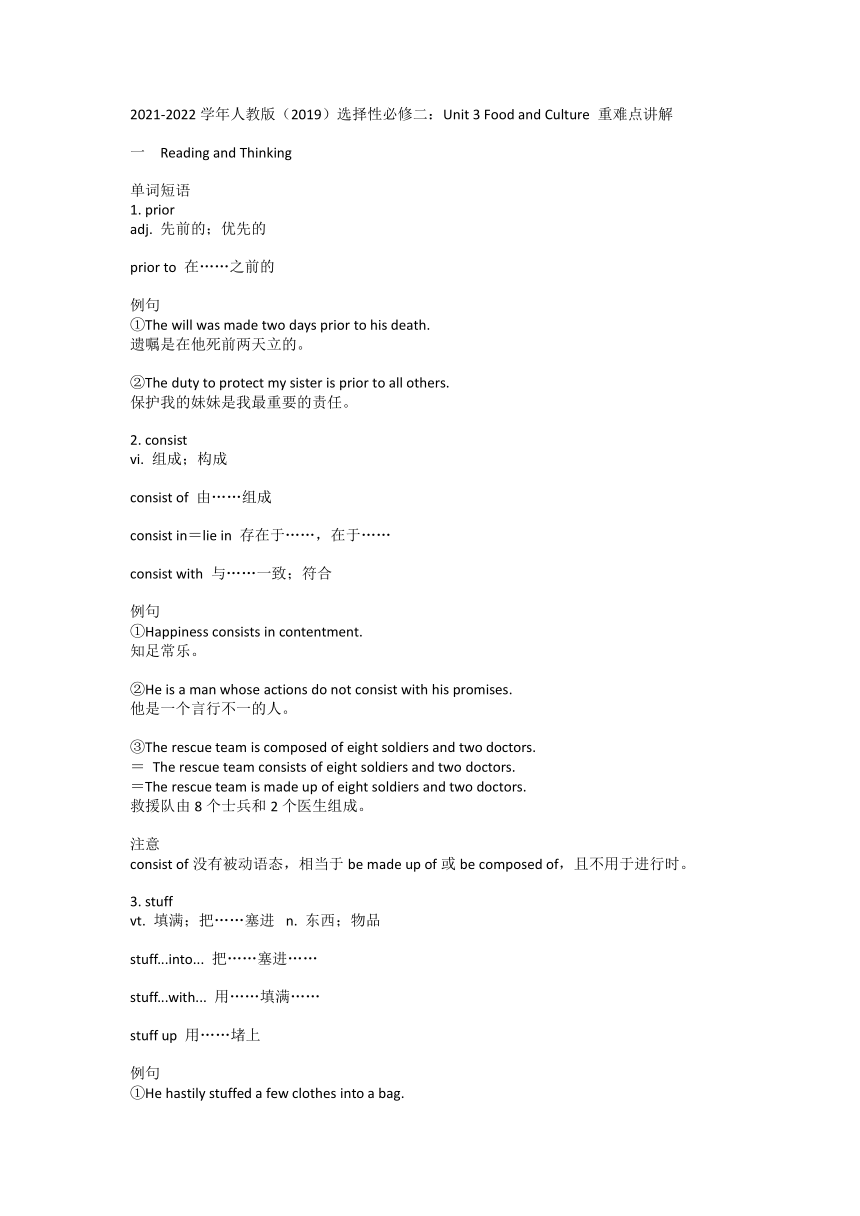 | |
| 格式 | doc | ||
| 文件大小 | 81.0KB | ||
| 资源类型 | 教案 | ||
| 版本资源 | 人教版(2019) | ||
| 科目 | 英语 | ||
| 更新时间 | 2021-09-09 15:21:21 | ||
图片预览

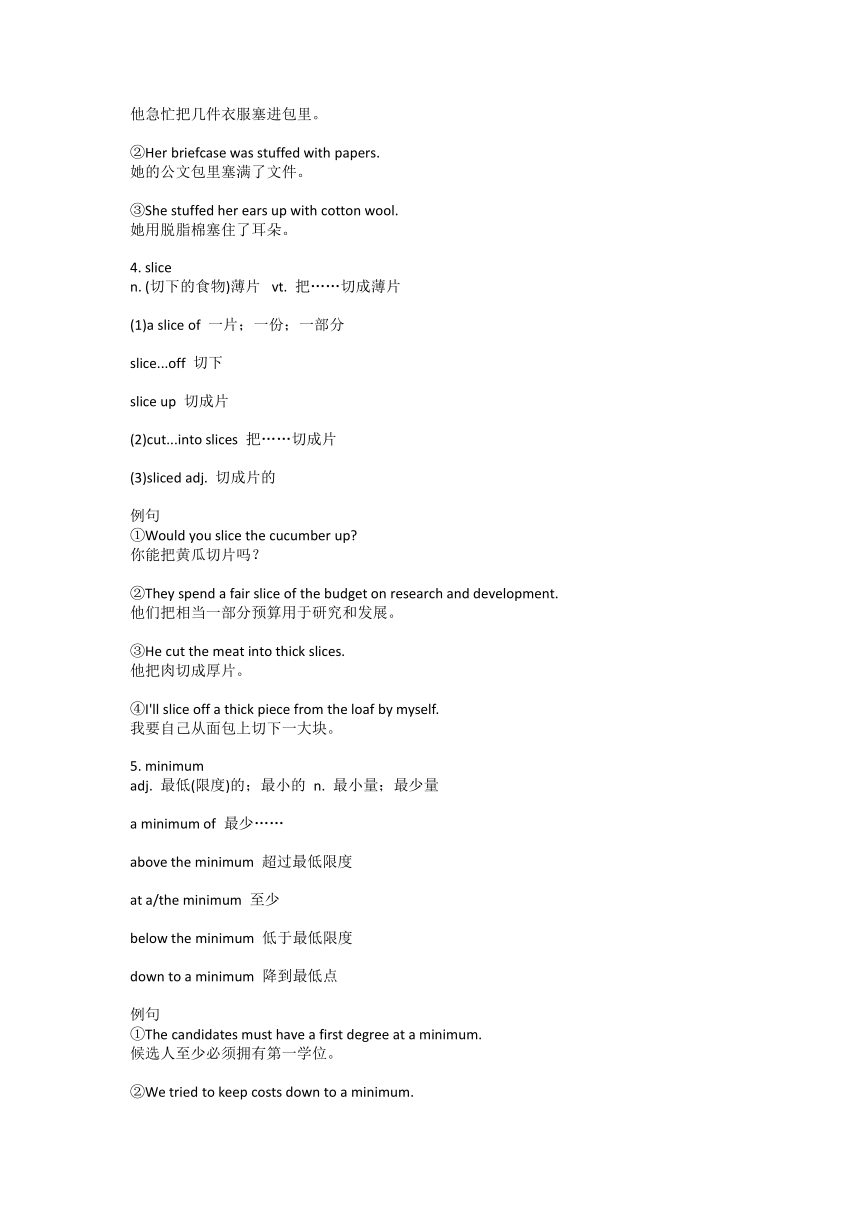
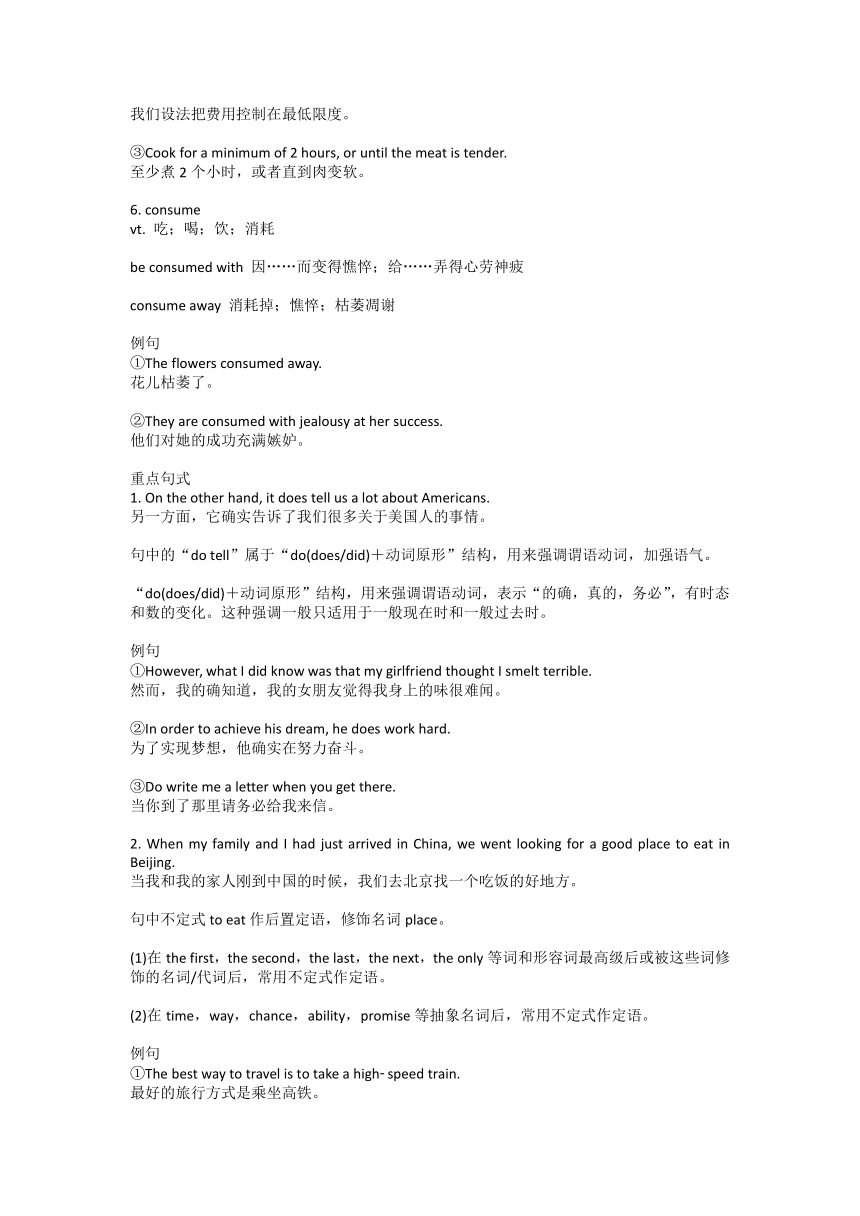
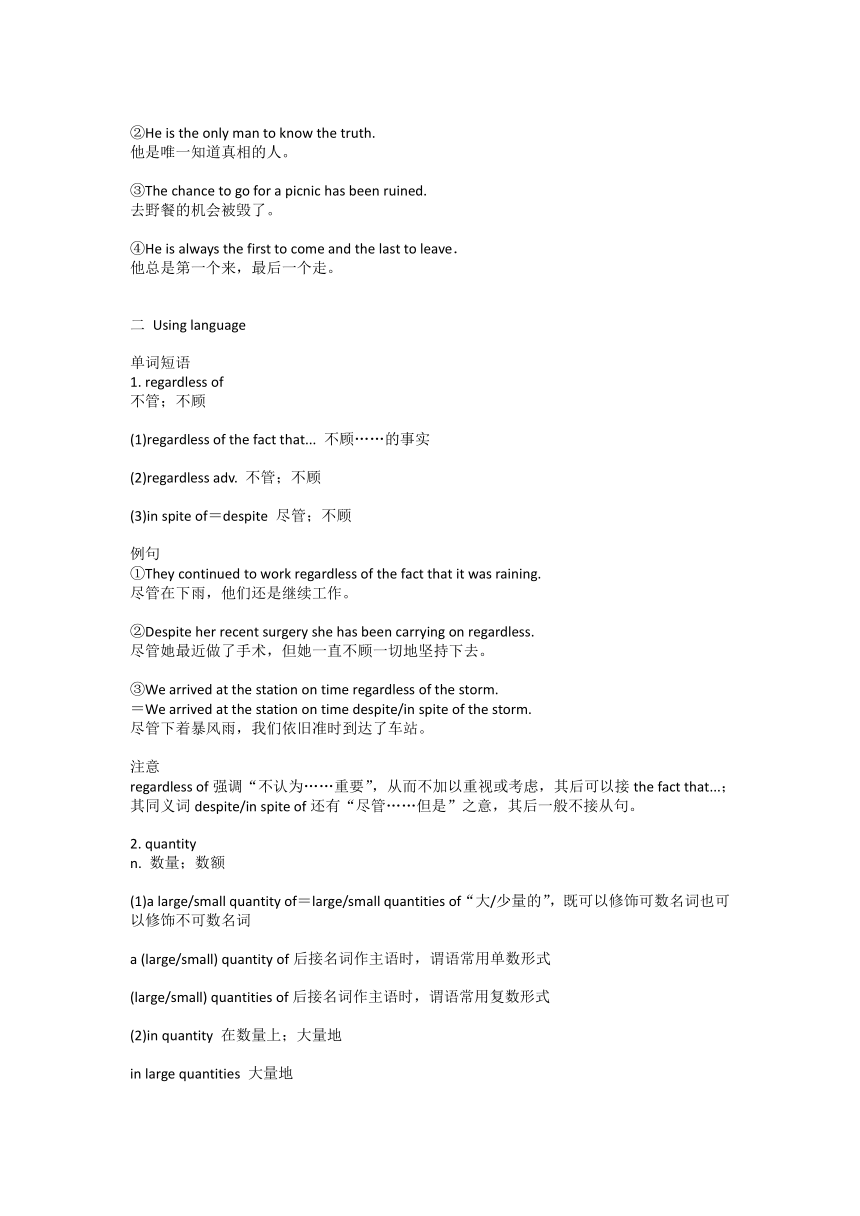
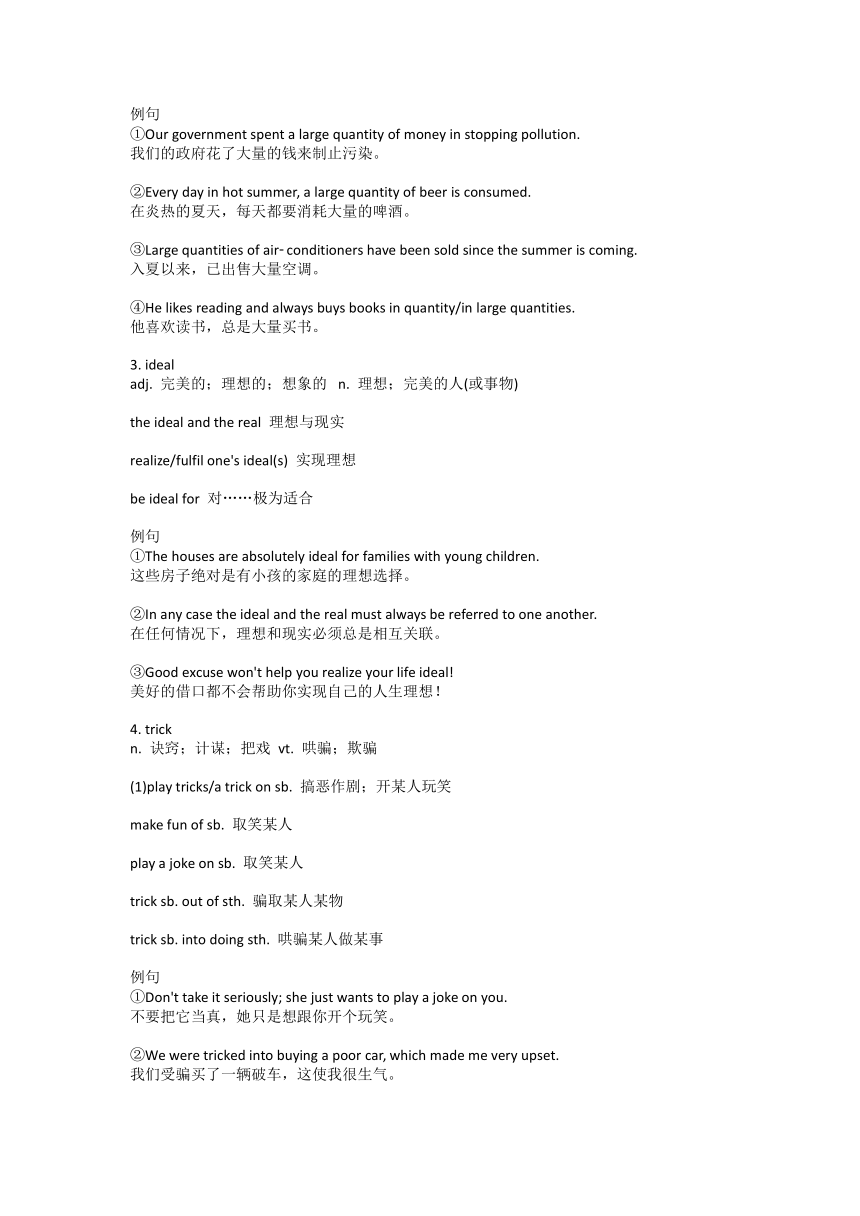
文档简介
2021-2022学年人教版(2019)选择性必修二:Unit
3
Food
and
Culture
重难点讲解
一
Reading
and
Thinking
单词短语
1.
prior
adj.
先前的;优先的
prior
to
在……之前的
例句
①The
will
was
made
two
days?prior
to?his
death.
遗嘱是在他死前两天立的。
②The
duty
to
protect
my
sister
is?prior
to?all
others.
保护我的妹妹是我最重要的责任。
2.
consist
vi.
组成;构成
consist
of
由……组成
consist
in=lie
in
存在于……,在于……
consist
with
与……一致;符合
例句
①Happiness?consists
in?contentment.
知足常乐。
②He
is
a
man
whose
actions
do
not?consist
with?his
promises.
他是一个言行不一的人。
③The
rescue
team?is
composed
of?eight
soldiers
and
two
doctors.
=
The
rescue
team?consists
of?eight
soldiers
and
two
doctors.
=The
rescue
team?is
made
up
of?eight
soldiers
and
two
doctors.
救援队由8个士兵和2个医生组成。
注意
consist
of没有被动语态,相当于be
made
up
of或be
composed
of,且不用于进行时。
3.
stuff
vt.
填满;把……塞进?
n.
东西;物品
stuff...into...
把……塞进……
stuff...with...
用……填满……
stuff
up
用……堵上
例句
①He
hastily?stuffed?a
few
clothes?into?a
bag.
他急忙把几件衣服塞进包里。
②Her
briefcase
was?stuffed
with?papers.
她的公文包里塞满了文件。
③She?stuffed?her
ears?up?with
cotton
wool.
她用脱脂棉塞住了耳朵。
4.
slice
n.
(切下的食物)薄片?
vt.
把……切成薄片
(1)a
slice
of
一片;一份;一部分
slice...off
切下
slice
up
切成片
(2)cut...into
slices
把……切成片
(3)sliced
adj.
切成片的
例句
①Would
you?slice?the
cucumber?up?
你能把黄瓜切片吗?
②They
spend?a
fair
slice
of?the
budget
on
research
and
development.
他们把相当一部分预算用于研究和发展。
③He?cut?the
meat?into
thick
slices.
他把肉切成厚片。
④I'll?slice
off?a
thick
piece
from
the
loaf
by
myself.
我要自己从面包上切下一大块。
5.
minimum
adj.
最低(限度)的;最小的
n.
最小量;最少量
a
minimum
of
最少……
above
the
minimum
超过最低限度
at
a/the
minimum
至少
below
the
minimum
低于最低限度
down
to
a
minimum
降到最低点
例句
①The
candidates
must
have
a
first
degree?at
a
minimum.
候选人至少必须拥有第一学位。
②We
tried
to
keep
costs?down
to
a
minimum.
我们设法把费用控制在最低限度。
③Cook
for?a
minimum
of?2
hours,
or
until
the
meat
is
tender.?
至少煮2个小时,或者直到肉变软。
6.
consume
vt.
吃;喝;饮;消耗
be
consumed
with
因……而变得憔悴;给……弄得心劳神疲
consume
away
消耗掉;憔悴;枯萎凋谢
例句
①The
flowers?consumed
away.?
花儿枯萎了。
②They?are
consumed
with?jealousy
at
her
success.?
他们对她的成功充满嫉妒。
重点句式
1.
On
the
other
hand,
it?does
tell?us
a
lot
about
Americans.?
另一方面,它确实告诉了我们很多关于美国人的事情。
句中的“do
tell”属于“do(does/did)+动词原形”结构,用来强调谓语动词,加强语气。
“do(does/did)+动词原形”结构,用来强调谓语动词,表示“的确,真的,务必”,有时态和数的变化。这种强调一般只适用于一般现在时和一般过去时。
例句
①However,
what
I?did
know?was
that
my
girlfriend
thought
I
smelt
terrible.
然而,我的确知道,我的女朋友觉得我身上的味很难闻。
②In
order
to
achieve
his
dream,
he?does
work?hard.
为了实现梦想,他确实在努力奋斗。
③Do
write?me
a
letter
when
you
get
there.
当你到了那里请务必给我来信。
2.
When
my
family
and
I
had
just
arrived
in
China,
we
went
looking
for
a
good
place
to
eat
in
Beijing.
当我和我的家人刚到中国的时候,我们去北京找一个吃饭的好地方。
句中不定式to
eat作后置定语,修饰名词place。
(1)在the
first,the
second,the
last,the
next,the
only等词和形容词最高级后或被这些词修饰的名词/代词后,常用不定式作定语。
(2)在time,way,chance,ability,promise等抽象名词后,常用不定式作定语。
例句
①The
best
way
to
travel
is?to
take?a
high?speed
train.
最好的旅行方式是乘坐高铁。
②He
is
the
only
man?to
know?the
truth.
他是唯一知道真相的人。
③The
chance?to
go?for
a
picnic
has
been
ruined.
去野餐的机会被毁了。
④He
is
always
the
first?to
come?and
the
last?to
leave.
他总是第一个来,最后一个走。
二
Using
language
单词短语
1.
regardless
of
不管;不顾
(1)regardless
of
the
fact
that...
不顾……的事实
(2)regardless
adv.
不管;不顾
(3)in
spite
of=despite
尽管;不顾
例句
①They
continued
to
work?regardless
of
the
fact
that?it
was
raining.
尽管在下雨,他们还是继续工作。
②Despite
her
recent
surgery
she
has
been
carrying
on?regardless.
尽管她最近做了手术,但她一直不顾一切地坚持下去。
③We
arrived
at
the
station
on
time?regardless?of?the
storm.
=We
arrived
at
the
station
on
time?despite/in
spite
of?the
storm.
尽管下着暴风雨,我们依旧准时到达了车站。
注意
regardless
of强调“不认为……重要”,从而不加以重视或考虑,其后可以接the
fact
that...;其同义词despite/in
spite
of还有“尽管……但是”之意,其后一般不接从句。
2.
quantity
n.
数量;数额
(1)a
large/small
quantity
of=large/small
quantities
of“大/少量的”,既可以修饰可数名词也可以修饰不可数名词
a
(large/small)
quantity
of后接名词作主语时,谓语常用单数形式
(large/small)
quantities
of后接名词作主语时,谓语常用复数形式
(2)in
quantity
在数量上;大量地
in
large
quantities
大量地
例句
①Our
government
spent?a
large
quantity
of?money
in
stopping
pollution.
我们的政府花了大量的钱来制止污染。
②Every
day
in
hot
summer,?a
large
quantity
of?beer
is
consumed.
在炎热的夏天,每天都要消耗大量的啤酒。
③Large
quantities
of?air?conditioners
have
been
sold
since
the
summer
is
coming.
入夏以来,已出售大量空调。
④He
likes
reading
and
always
buys
books?in
quantity/in
large
quantities.
他喜欢读书,总是大量买书。
3.
ideal
adj.
完美的;理想的;想象的?
n.
理想;完美的人(或事物)
the
ideal
and
the
real
理想与现实
realize/fulfil
one's
ideal(s)
实现理想
be
ideal
for
对……极为适合
例句
①The
houses
are
absolutely?ideal?for
families
with
young
children.
这些房子绝对是有小孩的家庭的理想选择。
②In
any
case?the
ideal
and
the
real?must
always
be
referred
to
one
another.
在任何情况下,理想和现实必须总是相互关联。
③Good
excuse
won't
help
you?realize
your
life
ideal!
美好的借口都不会帮助你实现自己的人生理想!
4.
trick
n.
诀窍;计谋;把戏
vt.
哄骗;欺骗
(1)play
tricks/a
trick
on
sb.
搞恶作剧;开某人玩笑
make
fun
of
sb.
取笑某人
play
a
joke
on
sb.
取笑某人
trick
sb.
out
of
sth.
骗取某人某物
trick
sb.
into
doing
sth.
哄骗某人做某事
例句
①Don't
take
it
seriously;
she
just
wants
to?play
a
joke
on?you.
不要把它当真,她只是想跟你开个玩笑。
②We
were?tricked
into?buying
a
poor
car,
which
made
me
very
upset.
我们受骗买了一辆破车,这使我很生气。
重点句式
Put
more
simply,?while?people
continue
to
argue
over
whether
or
not
fatty
food
is
dangerous,
we
already
know
that
sugar
is
a
killer.?
简而言之,当人们还在争论高脂肪食物是否危险时,我们已经知道糖是杀手。
句中while引导时间状语从句。
(1)while用作并列连词,表对比,意为“而”。
(2)while用作从属连词,引导时间状语从句,意为“在……期间,当……的时候”。从句中的谓语动词通常是延续性动词。
(3)while用作从属连词,引导让步状语从句,意为“虽然,尽管”,相当于though。
(4)while用作从属连词,引导条件状语从句,意为“只要”,相当于as
long
as。
(5)while用作名词,意为“一会儿;一段时间”,此时主要用于短语中;after
a
while过了一会儿;for
a
while暂时,一会儿;all
the
while一直,始终等。
例句
①While?there
is
life,
there
is
hope.
只要有生命就有希望。
②The
boy
is
good
at
maths?while?his
sister
is
good
at
Chinese.
那个男孩擅长数学而他妹妹擅长语文。
③While?I
understand
what
you
say,
I
can't
agree
with
you.
尽管我明白你的话,但我还是不同意。
④They
chatted?for
a
while?and
then
went
to
work.
他们聊了一会儿,然后就去上班了。
三
Grammar
过去完成时与过去完成时的被动语态
一、过去完成时
表示过去某一时间或动作以前已经发生或完成了的动作,对过去的某一点造成的某种影响或是结果,用来指在另一个过去行动之前就已经完成了的事件。在英语时态中,“时”指动作发生的时间,“态”指动作的样子和状态。它表示动作发生的时间是“过去的过去”,侧重事情的结果。由“had+过去分词”构成。
基本结构:had+动词过去分词
(1)肯定句:主语+had+动词过去分词+其他。
He
had
already
been
to
New
York
earlier
in
the
week.
本周早些时候他去过纽约。
(2)否定句:主语+had+not+动词过去分词+其他。
At
that
time
we
hadn't
met
her.
那时我们还没有见到她。
(3)疑问句:Had+主语+动词过去分词+其他?
肯定回答:Yes,主语+had.
否定回答:No,主语+hadn't.
—Had
you
visited
here
before??
——你以前参观过这里吗??
—Yes,
I
had./No,
I
hadn't.
——是,我去过。/没有,我以前没有去过。
(4)特殊疑问句:特殊疑问词或词组+had+主语+过去分词+其他?
Where
had
you
been
before
you
came
here?
你来这里前还去过哪儿?
(5)被动语态:主语+had
(not)+been+动词过去分词+其他。
By
the
end
of
last
year
all
the
preparatory
work
had
been
done.
到去年底为止,所有的准备工作都完成了。
二、基本用法
1.
表示在过去某一时刻或动作以前完成了的动作,也可以说过去的时间关于过去的动作。即“过去的过去”。可以用by,before等介词短语或一个时间状语从句来表示,也可以用一个表示过去的动作来表示,还可能通过上下文来表示。
By
nine
o'clock
last
night,
we
had
got
200
pictures
from
the
spaceship.
到昨晚9点钟,我们已经收到200张飞船发来的图片。
2.
表示由过去的某一时刻开始,一直延续到过去另一时间的动作或状态,常和for,since构成的时间状语连用。
I
had
been
at
the
bus
stop
for
20
minutes
when
a
bus
finally
came.
当车来的时候,我在车站已等了20分钟。
He
said
he
had
worked
in
that
factory
since
1949.
他说自从1949年以来他就在那家工厂工作。
3.
叙述过去发生的事情,在已叙述了过去发生的事情后,反过来追述或补述以前发生的动作时,常使用过去完成时。
Mr.
Smith
died
yesterday.
He
had
been
a
good
friend
of
mine.
史密斯先生昨天去世了。他以前是我的好友。
I
didn't
know
a
thing
about
the
verbs,
for
I
had
not
studied
my
lesson.
我对动词一无所知,因为我没有好好学习功课。
4.
在含有定语从句的主从复合句中,如果叙述过去的事,先发生的动作常用过去完成时。
I
returned
the
book
that
I
had
borrowed.
我已归还了我借的书。
She
found
the
key
that
she
had
lost.
她丢失的钥匙找到了。
5.
过去完成时常常用在told,said,knew,heard,thought等动词后的宾语从句(或间接引语)中,这时从句中的动作发生在主句表示的过去的动作之前。
He
said
that
he
had
known
her
well.
他说他很熟悉她。
I
thought
I
had
sent
the
letter
a
week
before.
我认为我一星期前就把信寄出去了。
6.
状语从句:在过去不同时间发生的两个动作中,发生在前,用过去完成时;发生在后,用一般过去时。如:when,before,after,as
soon
as,till/until引导的复合句。
When
I
woke
up,
it
had
already
stopped
raining.
我醒来时雨已停了。
She
didn't
go
to
bed
until
she
had
finished
her
work.
她直到把工作做完之后才睡觉。
注意
如果两个动作紧接着发生,则常常不用过去完成时,特别是在包含before和after的复合句中,因为从句的动作和主句的动作发生的先后顺序已经非常明确,可以用一般过去时代替过去完成时。
After
he
arrived
in
England,
Marx
worked
hard
to
improve
his
English.
马克思到达英格兰之后,努力提高他的英语水平。
7.
动词think,want,hope,mean,plan,intend等用过去完成时来表示过去未曾实现的想法、希望、打算或意图等。
They
had
wanted
to
help
but
could
not
get
there
in
time.
他们本来打算去帮忙,但没有及时赶到那里。
We
had
hoped
to
be
able
to
come
and
see
you.
我们本来希望能来看看你。
8.
过去完成时还可用在hardly...when...,no
sooner...than
...,it
was
the
first
(second,etc)
time
(that).
..等固定句型中。
Hardly
had
he
begun
to
speak
when
the
audience
interrupted
him.
他刚开始演讲,听众就打断了他。
No
sooner
had
he
arrived
than
he
went
away
again.
他刚到就又走了。
It
was
the
third
time
that
he
had
been
out
of
work
that
year.
这是他那一年第三次失业了。
三、与现在完成时的区别
现在完成时表示的动作发生在过去,以now的时间为基点,但侧重对now产生的结果或造成的影响;过去完成时则是一个相对的时态,以过去时间为基点,它所表示的动作不仅发生在过去,更强调“过去的过去”,只有和过去某时或某动作相比较时,才用到它。
比较
I
have
learned
1,000
English
words
so
far.
到目前为止我已经学会了1000个英语单词。
I
had
learned
1,000
English
words
till
then.
到那时为止我已经学会了1000个英语单词。
—I'm
sorry
to
keep
you
waiting.
——对不起,让你久等了。
—Oh,
not
at
all.
I
have
been
here
only
a
few
minutes.
——没什么,我只等了几分钟。
四、过去完成时的被动语态
过去完成时的被动语态是过去完成时态和被动语态的结合。表示过去某一时间以前已经被完成的动作,常与by,before等引导的时间状语连用。由“had+been+过去分词”构成。
1.
过去完成时的被动语态有以下三种形式
(1)肯定结构:主语+
had
been
done
+其他成分。
(2)否定结构:主语+
had
not
been
done
+其他成分。
(3)疑问句结构:had
+主语+
been
done
+其他成分?
疑问词+
had
+主语+
been
done
+其他成分?
2.
过去完成时的被动语态常用于以下三种情况
(1)表示过去某一时间以前已经完成的动作,常与by,before等引导的时间状语连用。
By
the
time
he
got
to
the
school,
the
first
class
had
been
finished.
当他到达学校时,第一节课已经结束了。
The
classroom
hadn't
been
cleaned
before
the
teacher
came.
老师来之前,教室还没有打扫过。
How
many
buildings
had
been
destroyed
when
the
earthquake
ended??
地震结束时有多少建筑物被毁?
(2)根据语意可以判断出动作先后的被动语态,用过去完成时。
As
the
assignment
had
been
done,
he
went
on
to
search
the
Internet.
任务完成后,他继续上网搜索。
He
did
what
he
had
been
told
to.
他做了别人叫他做的事。
注意
当从句由after,before,when或
as
soon
as引导时,主句和从句都可以用一般过去时。
When
he
arrived,
he
called
her.
他到达时,给她打了电话。
They
locked
the
door
before
they
left.
在离开前,他们把门锁上了。
(3)在told,said,knew,heard,thought等动词之后的宾语从句中,若表示过去某一被动动作时,用过去完成时。
They
said
the
production
costs
had
been
reduced.
他们说生产成本已经降低了。
The
girl
was
reminded
that
her
homework
had
not
been
handed
in.
那个女孩被提醒她的家庭作业还没有交。
The
media
reported
more
than
1,000
people
had
been
killed
in
the
earthquake.
媒体报道有1000多人在地震中丧生。
注意
过去完成时被动语态与现在完成时被动语态用法区别:现在完成时被动语态表示相对于现在来说已被完成的动作,过去完成时被动语态表示相对于过去某一时刻来说已被完成的动作。
例如:This
polluted
river
has
been
cleaned.
这条被污染了的河流已被净化。
析:该句表示到现在为止这条河流已被净化。
例如:He
said
this
book
had
been
translated
into
Japanese.
他说这本书已被译成日语。
析:该句表示到他说话时所体现的时间为止这本书已被译成日语。
四
Writing
描述类说明文
文体指导
描述类说明文一般是用简明的语言对某个事物、某项活动、某个产品或者某种风俗习惯进行描写,从而给读者提供知识的一种文体。
基本框架
描述类说明文的结构安排:
1.
简要说明所要描述的事物。
2.
从不同的方面详细说明,并表达自己的看法或观点。
3.
总结概括。
写作时应注意以下三个方面:
1.
此类书面表达通常为话题作文或看图作文,所以应仔细研读提示信息或图画,明确应围绕什么问题或现象展开评论。
2.
围绕主题进行拓展。根据要求和提示信息合理安排篇章中各部分内容的比例,做到详略得当、条理清楚、文字简练。
3.
时态:多采用一般现在时,但如果提示中给出了具体时间,可对时态进行相应的调整。
常用词块
1.
keep
us
healthy
使我们健康
2.
have
healthy
eating
habits
有健康的饮食习惯
3.
in
different
ways
以不同的方式
4.
be
very
important
for
对……非常重要
5.
stay
far
from
远离
6.
a
growing
focus
on
health
care
越来越注重养生
7.
be
of
great
help
to
对……帮助很大
8.
change
some
of
our
eating
habits
改变一些我们的饮食习惯
9.
for
some
reason
由于某个理由;由于某种原因
10.
realize
the
importance
of
意识到……的重要性
常用语句
1.
Healthy
eating
habits
are
very
important
for
our
health.
健康的饮食习惯对我们的健康很重要。
2.
Besides,
we
should
focus
on
a
balanced
diet,
which
assures
us
the
necessary
nutritions.
此外,我们应该注意饮食平衡,这能保证我们必要的营养。
3.
It
is
said
that
most
of
the
students
do
not
eat
anything
at
all
in
the
morning,
which
is
very
bad
for
health.
据说大部分的学生早上几乎什么都不吃,这对健康是有害的。
4.
As
the
saying
goes,
bread
is
the
staff
of
life,
eating
healthily
and
deliciously
is
the
goal
we
pursue.
俗话说,民以食为天,吃得美味又健康是我们所追求的目标。
5.
From
my
point
of
view,
in
order
to
build
healthy
eating
habits,
we
should
eat
more
vegetables
and
less
fat
and
sugar.
我认为,为了养成健康的饮食习惯,我们应该多吃蔬菜,少摄入脂肪和糖分。
6.
All
in
all,
we
should
realize
the
importance
of
healthy
diet.
总之,我们应该意识到健康饮食的重要性。
学以致用
请用英语写一篇短文,描述自己的饮食习惯,并就“健康饮食”提出自己的看法或建议。
注意:1.
字数80左右;
2.
可适当增加细节,以使行文连贯。
参考范文
?
?
?
?
Like
most
people
from
the
North,
cooked
wheaten
food
is
always
my
favorite.
I
often
have
noodles
for
breakfast,
steam
bread
or
pancake
for
lunch
and
supper.
I
eat
vegetables
every
day.
I
like
seafood
though
it's
a
little
expensive.
I
often
go
out
for
good
meals
with
my
families
and
friends,
but
we
often
eat
a
lot
of
meat
there.
?
?
?
?
I
think
we
should
form
healthy
eating
habits.
Breakfast
is
very
important
to
our
health.
Besides,
we'd
better
eat
less
meat
and
more
fresh
vegetables.
All
in
all,
we
should
realize
the
importance
of
healthy
diet.
3
Food
and
Culture
重难点讲解
一
Reading
and
Thinking
单词短语
1.
prior
adj.
先前的;优先的
prior
to
在……之前的
例句
①The
will
was
made
two
days?prior
to?his
death.
遗嘱是在他死前两天立的。
②The
duty
to
protect
my
sister
is?prior
to?all
others.
保护我的妹妹是我最重要的责任。
2.
consist
vi.
组成;构成
consist
of
由……组成
consist
in=lie
in
存在于……,在于……
consist
with
与……一致;符合
例句
①Happiness?consists
in?contentment.
知足常乐。
②He
is
a
man
whose
actions
do
not?consist
with?his
promises.
他是一个言行不一的人。
③The
rescue
team?is
composed
of?eight
soldiers
and
two
doctors.
=
The
rescue
team?consists
of?eight
soldiers
and
two
doctors.
=The
rescue
team?is
made
up
of?eight
soldiers
and
two
doctors.
救援队由8个士兵和2个医生组成。
注意
consist
of没有被动语态,相当于be
made
up
of或be
composed
of,且不用于进行时。
3.
stuff
vt.
填满;把……塞进?
n.
东西;物品
stuff...into...
把……塞进……
stuff...with...
用……填满……
stuff
up
用……堵上
例句
①He
hastily?stuffed?a
few
clothes?into?a
bag.
他急忙把几件衣服塞进包里。
②Her
briefcase
was?stuffed
with?papers.
她的公文包里塞满了文件。
③She?stuffed?her
ears?up?with
cotton
wool.
她用脱脂棉塞住了耳朵。
4.
slice
n.
(切下的食物)薄片?
vt.
把……切成薄片
(1)a
slice
of
一片;一份;一部分
slice...off
切下
slice
up
切成片
(2)cut...into
slices
把……切成片
(3)sliced
adj.
切成片的
例句
①Would
you?slice?the
cucumber?up?
你能把黄瓜切片吗?
②They
spend?a
fair
slice
of?the
budget
on
research
and
development.
他们把相当一部分预算用于研究和发展。
③He?cut?the
meat?into
thick
slices.
他把肉切成厚片。
④I'll?slice
off?a
thick
piece
from
the
loaf
by
myself.
我要自己从面包上切下一大块。
5.
minimum
adj.
最低(限度)的;最小的
n.
最小量;最少量
a
minimum
of
最少……
above
the
minimum
超过最低限度
at
a/the
minimum
至少
below
the
minimum
低于最低限度
down
to
a
minimum
降到最低点
例句
①The
candidates
must
have
a
first
degree?at
a
minimum.
候选人至少必须拥有第一学位。
②We
tried
to
keep
costs?down
to
a
minimum.
我们设法把费用控制在最低限度。
③Cook
for?a
minimum
of?2
hours,
or
until
the
meat
is
tender.?
至少煮2个小时,或者直到肉变软。
6.
consume
vt.
吃;喝;饮;消耗
be
consumed
with
因……而变得憔悴;给……弄得心劳神疲
consume
away
消耗掉;憔悴;枯萎凋谢
例句
①The
flowers?consumed
away.?
花儿枯萎了。
②They?are
consumed
with?jealousy
at
her
success.?
他们对她的成功充满嫉妒。
重点句式
1.
On
the
other
hand,
it?does
tell?us
a
lot
about
Americans.?
另一方面,它确实告诉了我们很多关于美国人的事情。
句中的“do
tell”属于“do(does/did)+动词原形”结构,用来强调谓语动词,加强语气。
“do(does/did)+动词原形”结构,用来强调谓语动词,表示“的确,真的,务必”,有时态和数的变化。这种强调一般只适用于一般现在时和一般过去时。
例句
①However,
what
I?did
know?was
that
my
girlfriend
thought
I
smelt
terrible.
然而,我的确知道,我的女朋友觉得我身上的味很难闻。
②In
order
to
achieve
his
dream,
he?does
work?hard.
为了实现梦想,他确实在努力奋斗。
③Do
write?me
a
letter
when
you
get
there.
当你到了那里请务必给我来信。
2.
When
my
family
and
I
had
just
arrived
in
China,
we
went
looking
for
a
good
place
to
eat
in
Beijing.
当我和我的家人刚到中国的时候,我们去北京找一个吃饭的好地方。
句中不定式to
eat作后置定语,修饰名词place。
(1)在the
first,the
second,the
last,the
next,the
only等词和形容词最高级后或被这些词修饰的名词/代词后,常用不定式作定语。
(2)在time,way,chance,ability,promise等抽象名词后,常用不定式作定语。
例句
①The
best
way
to
travel
is?to
take?a
high?speed
train.
最好的旅行方式是乘坐高铁。
②He
is
the
only
man?to
know?the
truth.
他是唯一知道真相的人。
③The
chance?to
go?for
a
picnic
has
been
ruined.
去野餐的机会被毁了。
④He
is
always
the
first?to
come?and
the
last?to
leave.
他总是第一个来,最后一个走。
二
Using
language
单词短语
1.
regardless
of
不管;不顾
(1)regardless
of
the
fact
that...
不顾……的事实
(2)regardless
adv.
不管;不顾
(3)in
spite
of=despite
尽管;不顾
例句
①They
continued
to
work?regardless
of
the
fact
that?it
was
raining.
尽管在下雨,他们还是继续工作。
②Despite
her
recent
surgery
she
has
been
carrying
on?regardless.
尽管她最近做了手术,但她一直不顾一切地坚持下去。
③We
arrived
at
the
station
on
time?regardless?of?the
storm.
=We
arrived
at
the
station
on
time?despite/in
spite
of?the
storm.
尽管下着暴风雨,我们依旧准时到达了车站。
注意
regardless
of强调“不认为……重要”,从而不加以重视或考虑,其后可以接the
fact
that...;其同义词despite/in
spite
of还有“尽管……但是”之意,其后一般不接从句。
2.
quantity
n.
数量;数额
(1)a
large/small
quantity
of=large/small
quantities
of“大/少量的”,既可以修饰可数名词也可以修饰不可数名词
a
(large/small)
quantity
of后接名词作主语时,谓语常用单数形式
(large/small)
quantities
of后接名词作主语时,谓语常用复数形式
(2)in
quantity
在数量上;大量地
in
large
quantities
大量地
例句
①Our
government
spent?a
large
quantity
of?money
in
stopping
pollution.
我们的政府花了大量的钱来制止污染。
②Every
day
in
hot
summer,?a
large
quantity
of?beer
is
consumed.
在炎热的夏天,每天都要消耗大量的啤酒。
③Large
quantities
of?air?conditioners
have
been
sold
since
the
summer
is
coming.
入夏以来,已出售大量空调。
④He
likes
reading
and
always
buys
books?in
quantity/in
large
quantities.
他喜欢读书,总是大量买书。
3.
ideal
adj.
完美的;理想的;想象的?
n.
理想;完美的人(或事物)
the
ideal
and
the
real
理想与现实
realize/fulfil
one's
ideal(s)
实现理想
be
ideal
for
对……极为适合
例句
①The
houses
are
absolutely?ideal?for
families
with
young
children.
这些房子绝对是有小孩的家庭的理想选择。
②In
any
case?the
ideal
and
the
real?must
always
be
referred
to
one
another.
在任何情况下,理想和现实必须总是相互关联。
③Good
excuse
won't
help
you?realize
your
life
ideal!
美好的借口都不会帮助你实现自己的人生理想!
4.
trick
n.
诀窍;计谋;把戏
vt.
哄骗;欺骗
(1)play
tricks/a
trick
on
sb.
搞恶作剧;开某人玩笑
make
fun
of
sb.
取笑某人
play
a
joke
on
sb.
取笑某人
trick
sb.
out
of
sth.
骗取某人某物
trick
sb.
into
doing
sth.
哄骗某人做某事
例句
①Don't
take
it
seriously;
she
just
wants
to?play
a
joke
on?you.
不要把它当真,她只是想跟你开个玩笑。
②We
were?tricked
into?buying
a
poor
car,
which
made
me
very
upset.
我们受骗买了一辆破车,这使我很生气。
重点句式
Put
more
simply,?while?people
continue
to
argue
over
whether
or
not
fatty
food
is
dangerous,
we
already
know
that
sugar
is
a
killer.?
简而言之,当人们还在争论高脂肪食物是否危险时,我们已经知道糖是杀手。
句中while引导时间状语从句。
(1)while用作并列连词,表对比,意为“而”。
(2)while用作从属连词,引导时间状语从句,意为“在……期间,当……的时候”。从句中的谓语动词通常是延续性动词。
(3)while用作从属连词,引导让步状语从句,意为“虽然,尽管”,相当于though。
(4)while用作从属连词,引导条件状语从句,意为“只要”,相当于as
long
as。
(5)while用作名词,意为“一会儿;一段时间”,此时主要用于短语中;after
a
while过了一会儿;for
a
while暂时,一会儿;all
the
while一直,始终等。
例句
①While?there
is
life,
there
is
hope.
只要有生命就有希望。
②The
boy
is
good
at
maths?while?his
sister
is
good
at
Chinese.
那个男孩擅长数学而他妹妹擅长语文。
③While?I
understand
what
you
say,
I
can't
agree
with
you.
尽管我明白你的话,但我还是不同意。
④They
chatted?for
a
while?and
then
went
to
work.
他们聊了一会儿,然后就去上班了。
三
Grammar
过去完成时与过去完成时的被动语态
一、过去完成时
表示过去某一时间或动作以前已经发生或完成了的动作,对过去的某一点造成的某种影响或是结果,用来指在另一个过去行动之前就已经完成了的事件。在英语时态中,“时”指动作发生的时间,“态”指动作的样子和状态。它表示动作发生的时间是“过去的过去”,侧重事情的结果。由“had+过去分词”构成。
基本结构:had+动词过去分词
(1)肯定句:主语+had+动词过去分词+其他。
He
had
already
been
to
New
York
earlier
in
the
week.
本周早些时候他去过纽约。
(2)否定句:主语+had+not+动词过去分词+其他。
At
that
time
we
hadn't
met
her.
那时我们还没有见到她。
(3)疑问句:Had+主语+动词过去分词+其他?
肯定回答:Yes,主语+had.
否定回答:No,主语+hadn't.
—Had
you
visited
here
before??
——你以前参观过这里吗??
—Yes,
I
had./No,
I
hadn't.
——是,我去过。/没有,我以前没有去过。
(4)特殊疑问句:特殊疑问词或词组+had+主语+过去分词+其他?
Where
had
you
been
before
you
came
here?
你来这里前还去过哪儿?
(5)被动语态:主语+had
(not)+been+动词过去分词+其他。
By
the
end
of
last
year
all
the
preparatory
work
had
been
done.
到去年底为止,所有的准备工作都完成了。
二、基本用法
1.
表示在过去某一时刻或动作以前完成了的动作,也可以说过去的时间关于过去的动作。即“过去的过去”。可以用by,before等介词短语或一个时间状语从句来表示,也可以用一个表示过去的动作来表示,还可能通过上下文来表示。
By
nine
o'clock
last
night,
we
had
got
200
pictures
from
the
spaceship.
到昨晚9点钟,我们已经收到200张飞船发来的图片。
2.
表示由过去的某一时刻开始,一直延续到过去另一时间的动作或状态,常和for,since构成的时间状语连用。
I
had
been
at
the
bus
stop
for
20
minutes
when
a
bus
finally
came.
当车来的时候,我在车站已等了20分钟。
He
said
he
had
worked
in
that
factory
since
1949.
他说自从1949年以来他就在那家工厂工作。
3.
叙述过去发生的事情,在已叙述了过去发生的事情后,反过来追述或补述以前发生的动作时,常使用过去完成时。
Mr.
Smith
died
yesterday.
He
had
been
a
good
friend
of
mine.
史密斯先生昨天去世了。他以前是我的好友。
I
didn't
know
a
thing
about
the
verbs,
for
I
had
not
studied
my
lesson.
我对动词一无所知,因为我没有好好学习功课。
4.
在含有定语从句的主从复合句中,如果叙述过去的事,先发生的动作常用过去完成时。
I
returned
the
book
that
I
had
borrowed.
我已归还了我借的书。
She
found
the
key
that
she
had
lost.
她丢失的钥匙找到了。
5.
过去完成时常常用在told,said,knew,heard,thought等动词后的宾语从句(或间接引语)中,这时从句中的动作发生在主句表示的过去的动作之前。
He
said
that
he
had
known
her
well.
他说他很熟悉她。
I
thought
I
had
sent
the
letter
a
week
before.
我认为我一星期前就把信寄出去了。
6.
状语从句:在过去不同时间发生的两个动作中,发生在前,用过去完成时;发生在后,用一般过去时。如:when,before,after,as
soon
as,till/until引导的复合句。
When
I
woke
up,
it
had
already
stopped
raining.
我醒来时雨已停了。
She
didn't
go
to
bed
until
she
had
finished
her
work.
她直到把工作做完之后才睡觉。
注意
如果两个动作紧接着发生,则常常不用过去完成时,特别是在包含before和after的复合句中,因为从句的动作和主句的动作发生的先后顺序已经非常明确,可以用一般过去时代替过去完成时。
After
he
arrived
in
England,
Marx
worked
hard
to
improve
his
English.
马克思到达英格兰之后,努力提高他的英语水平。
7.
动词think,want,hope,mean,plan,intend等用过去完成时来表示过去未曾实现的想法、希望、打算或意图等。
They
had
wanted
to
help
but
could
not
get
there
in
time.
他们本来打算去帮忙,但没有及时赶到那里。
We
had
hoped
to
be
able
to
come
and
see
you.
我们本来希望能来看看你。
8.
过去完成时还可用在hardly...when...,no
sooner...than
...,it
was
the
first
(second,etc)
time
(that).
..等固定句型中。
Hardly
had
he
begun
to
speak
when
the
audience
interrupted
him.
他刚开始演讲,听众就打断了他。
No
sooner
had
he
arrived
than
he
went
away
again.
他刚到就又走了。
It
was
the
third
time
that
he
had
been
out
of
work
that
year.
这是他那一年第三次失业了。
三、与现在完成时的区别
现在完成时表示的动作发生在过去,以now的时间为基点,但侧重对now产生的结果或造成的影响;过去完成时则是一个相对的时态,以过去时间为基点,它所表示的动作不仅发生在过去,更强调“过去的过去”,只有和过去某时或某动作相比较时,才用到它。
比较
I
have
learned
1,000
English
words
so
far.
到目前为止我已经学会了1000个英语单词。
I
had
learned
1,000
English
words
till
then.
到那时为止我已经学会了1000个英语单词。
—I'm
sorry
to
keep
you
waiting.
——对不起,让你久等了。
—Oh,
not
at
all.
I
have
been
here
only
a
few
minutes.
——没什么,我只等了几分钟。
四、过去完成时的被动语态
过去完成时的被动语态是过去完成时态和被动语态的结合。表示过去某一时间以前已经被完成的动作,常与by,before等引导的时间状语连用。由“had+been+过去分词”构成。
1.
过去完成时的被动语态有以下三种形式
(1)肯定结构:主语+
had
been
done
+其他成分。
(2)否定结构:主语+
had
not
been
done
+其他成分。
(3)疑问句结构:had
+主语+
been
done
+其他成分?
疑问词+
had
+主语+
been
done
+其他成分?
2.
过去完成时的被动语态常用于以下三种情况
(1)表示过去某一时间以前已经完成的动作,常与by,before等引导的时间状语连用。
By
the
time
he
got
to
the
school,
the
first
class
had
been
finished.
当他到达学校时,第一节课已经结束了。
The
classroom
hadn't
been
cleaned
before
the
teacher
came.
老师来之前,教室还没有打扫过。
How
many
buildings
had
been
destroyed
when
the
earthquake
ended??
地震结束时有多少建筑物被毁?
(2)根据语意可以判断出动作先后的被动语态,用过去完成时。
As
the
assignment
had
been
done,
he
went
on
to
search
the
Internet.
任务完成后,他继续上网搜索。
He
did
what
he
had
been
told
to.
他做了别人叫他做的事。
注意
当从句由after,before,when或
as
soon
as引导时,主句和从句都可以用一般过去时。
When
he
arrived,
he
called
her.
他到达时,给她打了电话。
They
locked
the
door
before
they
left.
在离开前,他们把门锁上了。
(3)在told,said,knew,heard,thought等动词之后的宾语从句中,若表示过去某一被动动作时,用过去完成时。
They
said
the
production
costs
had
been
reduced.
他们说生产成本已经降低了。
The
girl
was
reminded
that
her
homework
had
not
been
handed
in.
那个女孩被提醒她的家庭作业还没有交。
The
media
reported
more
than
1,000
people
had
been
killed
in
the
earthquake.
媒体报道有1000多人在地震中丧生。
注意
过去完成时被动语态与现在完成时被动语态用法区别:现在完成时被动语态表示相对于现在来说已被完成的动作,过去完成时被动语态表示相对于过去某一时刻来说已被完成的动作。
例如:This
polluted
river
has
been
cleaned.
这条被污染了的河流已被净化。
析:该句表示到现在为止这条河流已被净化。
例如:He
said
this
book
had
been
translated
into
Japanese.
他说这本书已被译成日语。
析:该句表示到他说话时所体现的时间为止这本书已被译成日语。
四
Writing
描述类说明文
文体指导
描述类说明文一般是用简明的语言对某个事物、某项活动、某个产品或者某种风俗习惯进行描写,从而给读者提供知识的一种文体。
基本框架
描述类说明文的结构安排:
1.
简要说明所要描述的事物。
2.
从不同的方面详细说明,并表达自己的看法或观点。
3.
总结概括。
写作时应注意以下三个方面:
1.
此类书面表达通常为话题作文或看图作文,所以应仔细研读提示信息或图画,明确应围绕什么问题或现象展开评论。
2.
围绕主题进行拓展。根据要求和提示信息合理安排篇章中各部分内容的比例,做到详略得当、条理清楚、文字简练。
3.
时态:多采用一般现在时,但如果提示中给出了具体时间,可对时态进行相应的调整。
常用词块
1.
keep
us
healthy
使我们健康
2.
have
healthy
eating
habits
有健康的饮食习惯
3.
in
different
ways
以不同的方式
4.
be
very
important
for
对……非常重要
5.
stay
far
from
远离
6.
a
growing
focus
on
health
care
越来越注重养生
7.
be
of
great
help
to
对……帮助很大
8.
change
some
of
our
eating
habits
改变一些我们的饮食习惯
9.
for
some
reason
由于某个理由;由于某种原因
10.
realize
the
importance
of
意识到……的重要性
常用语句
1.
Healthy
eating
habits
are
very
important
for
our
health.
健康的饮食习惯对我们的健康很重要。
2.
Besides,
we
should
focus
on
a
balanced
diet,
which
assures
us
the
necessary
nutritions.
此外,我们应该注意饮食平衡,这能保证我们必要的营养。
3.
It
is
said
that
most
of
the
students
do
not
eat
anything
at
all
in
the
morning,
which
is
very
bad
for
health.
据说大部分的学生早上几乎什么都不吃,这对健康是有害的。
4.
As
the
saying
goes,
bread
is
the
staff
of
life,
eating
healthily
and
deliciously
is
the
goal
we
pursue.
俗话说,民以食为天,吃得美味又健康是我们所追求的目标。
5.
From
my
point
of
view,
in
order
to
build
healthy
eating
habits,
we
should
eat
more
vegetables
and
less
fat
and
sugar.
我认为,为了养成健康的饮食习惯,我们应该多吃蔬菜,少摄入脂肪和糖分。
6.
All
in
all,
we
should
realize
the
importance
of
healthy
diet.
总之,我们应该意识到健康饮食的重要性。
学以致用
请用英语写一篇短文,描述自己的饮食习惯,并就“健康饮食”提出自己的看法或建议。
注意:1.
字数80左右;
2.
可适当增加细节,以使行文连贯。
参考范文
?
?
?
?
Like
most
people
from
the
North,
cooked
wheaten
food
is
always
my
favorite.
I
often
have
noodles
for
breakfast,
steam
bread
or
pancake
for
lunch
and
supper.
I
eat
vegetables
every
day.
I
like
seafood
though
it's
a
little
expensive.
I
often
go
out
for
good
meals
with
my
families
and
friends,
but
we
often
eat
a
lot
of
meat
there.
?
?
?
?
I
think
we
should
form
healthy
eating
habits.
Breakfast
is
very
important
to
our
health.
Besides,
we'd
better
eat
less
meat
and
more
fresh
vegetables.
All
in
all,
we
should
realize
the
importance
of
healthy
diet.
